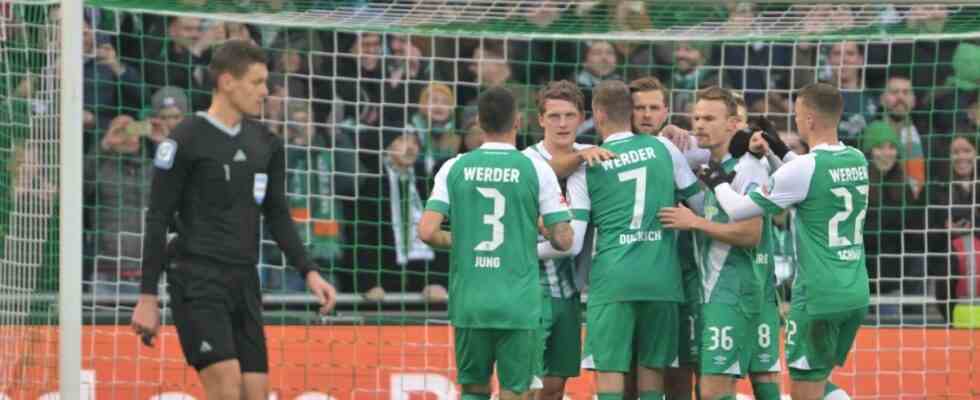Series in football can be imagined as snowballs and avalanches. The snowball, the positive series, starts small, for example with a difficult 3:2 against VfB Stuttgart. It slowly starts to roll, gets bigger and faster and at some point is so massive that the ball, which has long weighed tons, rolls over everything that stands in its way. Since matchday 8, VfL Wolfsburg has been unbeaten through the league, most recently with six wins in a row with 22:1 goals. This type of streak feeds itself, every win makes it bigger.
The avalanche, on the other hand, the series of defeats, suddenly breaks out, for example with a 1:6 against Bayern Munich. It upsets the usual order, it creates fear, and every attempt to escape from it on your own is mostly in vain. Everything dissolves in the avalanche, the results, the self-confidence, the order and the certainty that you were on safe ground the whole time. In this way, Werder Bremen recently suffered four defeats, and the snow was particularly dusty at 1:7 in Cologne.
In the wintry Weser Stadium, three degrees, ice-blue sky in Bremen, these two natural forces of sport met head-to-head, six-victory Wolfsburg and four-defeat Bremen. It was a game that proved once again that football doesn’t follow the laws of nature and that everything can be different today than it was yesterday. Werder again delivered one of those games for which the promoted team had been celebrated as an absolute enrichment of the Bundesliga in the first third of the season, and VfL didn’t play badly by far, but not as efficiently as usual.
Referee Daniel Siebert stands out in a strange way in two moments.
A pretty good game came about with a quite surprising result: The Wolfsburg snow globe got stuck in the outgoing Bremen avalanche, Werder won 2:1. Bremen’s goals of the day: Niclas Füllkrug, 24th minute and Niclas Füllkrug, 77th minute. Wolfsburg’s goal to make it 1-2 came too late (90′) – even though referee Daniel Siebert tormented the Hanseatic League with six minutes of stoppage time.
In what is probably the shortest winter break in Bundesliga history, which lasted from Wednesday to Saturday, Bremen apparently managed to come to terms with all the negative experiences of the young year. Werder coach Ole Werner said during the week that he had “never had any problems developing optimism and joy for the next task or having confidence in my team” – and that he would be out of place if he would be impressed by four lost games.
This time SV Werder manages without personal blackouts.
The achievements of the recently most controversial players were an expression of the successful management of the crisis. Goalkeeper Jiri Pavlenka flawless, the defensive midfielder Christian Groß as a fighting machine, in left midfield Anthony Jung sovereign against the in-form Wolfsburg Patrick Wimmer. Even Werder’s four-million riddle Jens Stage, brought from Copenhagen before the season as a royal transfer and surprisingly ordered by Ole Werner in the starting XI, convinced to the point of calf cramp.
Without personal blackouts, as Bremen had done in the defeats in Cologne (1:7) and against Union Berlin (1:2) in the style of a sitcom cast, the team is also able to beat the team in the league in the best form equal – on Saturday even: superior – to be. The victory against VfL was sovereign despite the late goal. In the final eight-minute character test called stoppage time, the intense game was once again dramatically summarized. Only at 5.28 p.m., after pack formation and another two dozen duels of the more intense kind, could the Bremen party in the Werder winter wonderland begin.
Spotted: Niclas Füllkrug converts the penalty to 1-0 for SV Werder Bremen. This was preceded by an idiosyncratic interpretation of the scene by referee Daniel Siebert.
(Photo: Teresa Kroeger/Nordphoto/Imago)
Werder had previously laid the foundation for the turnaround in a very fast first half, but only a handball from Yannick Gerhardt, shot from close range by Stage, brought the deserved return for the Bremen team, who seemed more determined overall. Füllkrug converted the penalty for the hosts, who also had the better chances away from this scene thanks to Stage and Füllkrug. Wolfsburg hit the crossbar once from offside, but the snowball didn’t roll through the Weser Stadium with the expected force – because Werder, unlike the 17 goals conceded in the last four games, defended very attentively, consistently and far-sightedly.
After the break, Bremen controlled the game without losing their balance and without losing sight of the goal of deciding the game. After Füllkrug’s conclusion to make it 2-0 after a well-played attack, they headed towards a secure victory, but it was only the punchline of the goal and the long injury time that turned the good game into a memorable Bundesliga game: Avalanche beats snowball.

